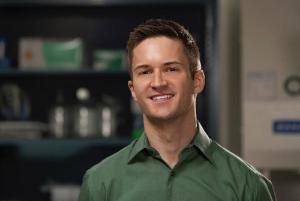

 |
|---|
| Theodore Scott Nowicki, M.D., Ph.D.’13 |
With more than fifty distinct subtypes, the group of cancers known as sarcomas affect tens of thousands of patients in the U.S., yet are notoriously difficult to treat. Inspired by the shortcomings of conventional cancer treatments and multiple innovative therapies against sarcomas, Theodore Scott Nowicki, M.D., Ph.D. ‘13, a rising star in the field of cancer immunology—has begun a clinical trial with the objective of developing an immunotherapeutic treatment. This innovative medicine, which is reliant on genetic modification to target specific markers on sarcomas, employs the regenerative qualities of hematopoietic stem cells to provide patients with short-term and long-term treatment with genetically modified T-cells.
Here Dr. Nowicki describes his novel research, reflects on who inspired him to pursue a career in cancer immunology and provides advice to future researchers considering dual M.D./Ph.D. degrees at New York Medical College (NYMC):
Describe your current work in stem cell immunotherapy. Why is this important?
Transgenic cell immunotherapy for cancer involves genetically engineering certain immune cells (known as T-cells) to express T-cell receptors against cancer-specific antigens. Chimeric antigen receptor (CAR)-T cells, which have yielded fantastic clinical responses against a variety of cancer types, follow a similar principle. However, although CAR-T cell treatment initially promotes a strong anti-cancer response, the treatment frequently fails and patients can relapse. There are multiple reasons for this: a lack of long term persistence of the genetically engineered T-cells, the progressive loss of functionality of these cells over time or both. By genetically engineering the T-cells and the bone marrow stem cells, we hope to generate renewable, cancer-specific T-cells. This could overcome the potential pitfalls of immunotherapy, resulting in a long-term treatment plan for cancer patients.
Who inspired you to take on sarcomas as your field of research?
I’ve had many exceptional mentors and I can honestly say that I wouldn't have succeeded without the kind of mentoring I have received over the course of my life. Dr. Antoni Ribas, my mentor at the University of California, Los Angeles (UCLA), inspired me to devote my research career to cancer immunotherapy and cellular immunotherapy. He is an exemplary physician-scientist who is responsible for some of the major breakthroughs in immune checkpoint blockade and transgenic cell immunotherapy. The stem cell immunotherapy trial was brought to fruition by the work of many talented people in his lab and our collaborators at UCLA and the California Institute of Technology (CalTech). I am forever indebted to my brilliant colleagues who worked to make this new therapy a reality.
Any words of advice for students considering an M.D./Ph.D. at NYMC?
The projects and the environment are important, but the foremost factor in choosing a lab is the people. The significance of having a great mentor and a great set of colleagues to work with cannot be overstated. I was incredibly lucky to have such fantastic mentors during my time at NYMC. I owe so much to my Ph.D. mentor Jan Geliebter, Ph.D., professor of microbiology and immunology and of otolaryngology; my graduate program advisor Raj Tiwari, Ph.D., associate professor of otolaryngology; and my clinical mentor in pediatric oncology Claudio Sandoval, M.D. '87, professor of pediatrics, as well as all the fantastic clinicians and scientists I have worked with over the years (too many to list)!